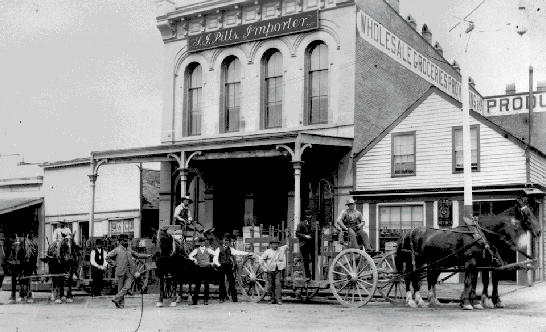The Indians were not the only people
that were drinking too much during the 1860's. So wht is it that they seem
to be only people that the government and others wanted to talk about at
the time? The white population was doing a fair amount of drinking as
well, if not more than the Indians, but for whatever reason their behavior
when they were drunk was not viewed as the same "problem" that the Indians
had. This section will show that much of the activities that the Natives
were involved in was very similar to that which the whites were doing when
they were drinking.
Just as the natives had been displaced by the gold
rush, so where many of the white people. As I have outlined in the previous
pages, Victoria was a very transient society during the early part of the
1860's and it remained that way for a number of years. Many of the people
that came into the city at the time were of poor character and for the most
part, the activities that they enjoyed were drinking or involved drinking.
With such people coming to town liquor became a very profitable business.
Then in the mid 1860's alcohol became a crutch for the people when a mini
depression era hit. Much of the original boom of the gold rush had disappeared
leaving behind a town with many undesirable qualities. Victoria had grown
too fast and the town was over populated with inadequate drinking water and
sewage systems.
(48)
One of the few constants in an otherwise often bleak landscape was
the drinking which was an activity that the white population enjoyed just
as much as any other group of people.
In Kennedy's correspondence with the colonial office
he discussed a petition that had been circulated by people who wanted
to ban selling liquor in Victoria.
(49)
The petition was signed by three hundred and fourteen people. 191
of those people who signed the petition said that they did not support a
ban on alcohol in the city.
(50)
It was a common sentiment of the people that they wanted liquor to be
available in town. What is important to remember about such statistics is
that the people that signed those petitions and others like them were the
white population. Natives and other groups had no idea of the petitions,
it was the white people who signed them, and the whites wanted alcohol
to remain.
Kennedy also noted the large number of saloons that
existed in the city. There was over one hundred places available to obtain
liquor in Victoria during the mid 1860's.
(51)
The Chief Justice declared that any law controlling liquor would
have been a "prohibitory and highly penal statute invading the common
rights of her majesty's subjects and is in fact repugnant to natural justice."
(52)
We know that the white people wanted to keep their liquor and that
it was readily available, but did any different than the natives did when
they were drunk?

